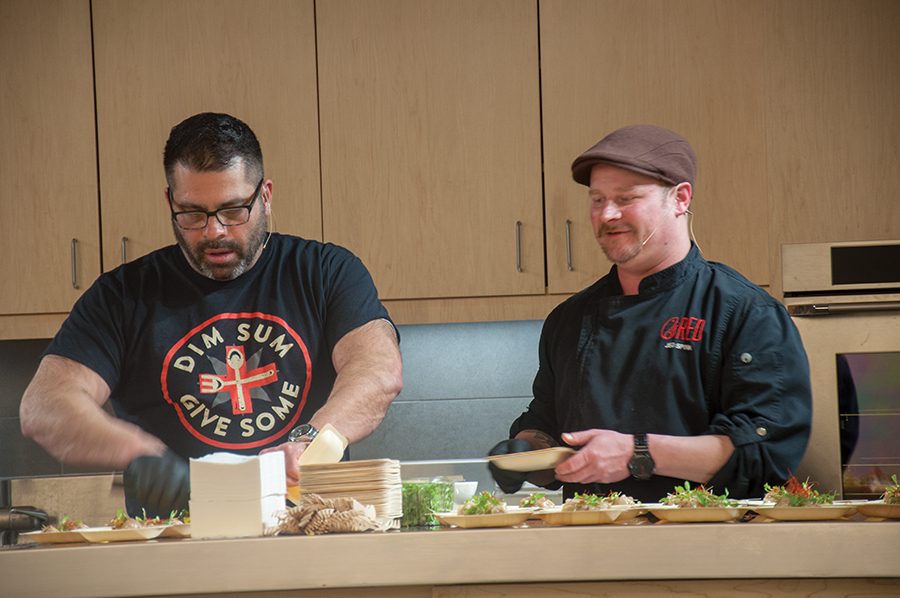RED chef talks dumplings and success
Jed Spink, right, the executive chef of RED Restaurant, visited Madison College to talk pro tips in the most recent Chef Series.
April 17, 2018
At the finale of Madison College’s 2017-2018 chef series, Jed Spink, the executive chef of restaurant RED was invited to talk about how he fuses multiple cultures into a tasty recipe, as well as his experience moving up in the restaurant industry without a culinary degree.
The night was filled with “Pro-tips,” as host of the event Joe Gaglio would say. Spink taught the audience how to fold dumplings, a fast way to make a flavorful hollandaise, and important tips on how not to light your bamboo steamers on fire.
On the menu for the evening was wagyu beef shumai dumplings, kimchi hollandaise, and sautéed bok choy.
This recipe was chosen for the evening after Gaglio recently dined at RED. As Gaglio explains, Spink originally wasn’t sure what to make for his demo for the series, and kept asking Gaglio “Should we do this? Should we do this?” After tasting the wagyu dumpling, all Gaglio had to say was, “Serve that dumpling that you gave me!”
Both the dumping and the bok choy contained one of Spink’s not-so-secret, but favorite ingredients: spicy chili crisp. The ingredient has become notorious in the kitchen of RED, to the point where some of the other chefs in the kitchen often joke with him that everything needs more spicy chili crisp.
All the recipes cooked throughout the night demonstrated how Spink prefers to find inspiration for the menu at RED. At RED, Spink likes to assure that typical Asian fair cannot be found on the menu. As he explains, no one will ever be able to order chicken fried rice while dining at RED.
Rather, Spink explains that he likes to fuse influences together to create imaginative and savory cuisine. Spink finds inspiration from combing “Asian influences with French techniques.”
For example, the choice of serving a hollandaise sauce that evening seemed like a typical choice of a follower of Julia Child, but by adding in Kim Chi instead of cayenne pepper, the sauce was now a perfect fusion of Asian and French cooking.
Spink’s interest in cooking was cultivated as a child. As a child of two parents who worked two jobs, Spink often helped out his family by cooking meals after school, which is where he gained his first experience as a chef. In addition, Spink also took interest in watching cooking shows young. As Spink explains, they were real cooking shows with real recipes, not just the game shows designed as cooking shows that have rose to popularity in recent years.
Spink’s first job in the culinary industry was as a dish washer. Eventually, Spink rose through the ranks and was able to work as an executive chef at more than one restaurant throughout his career. Spink was able to do all of this without attending culinary school.
Though Spink values and respects what culinary school has to offer, he knew that it just wasn’t for him. Spink found the experience of learning through working to be a better fit for him.
“While my friend is at school learning how to cut fish, I’m learning how to cut fish and I’m getting paid for it,” explained Spink.
Spink believes that other aspiring chefs who do not fit the mold of a college student can still work their way to the top like he did in the food industry.
“I think it is more possible than ever,” explained Spink.
































